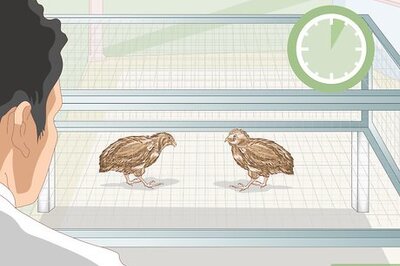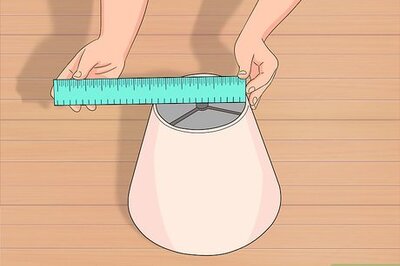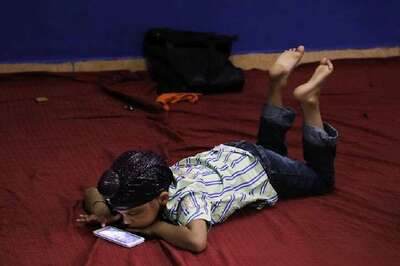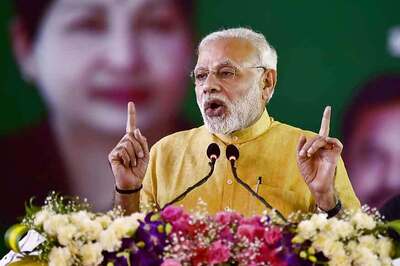
views
BANGALORE: Vani Murthy, a resident of Malleswaram couldn’t watch tonnes of waste being dumped in the landfills and thus wasted. She led from the front and together with the help of a bunch of kids, she started waste management at her own apartment situated in 15th cross. Renaissance Regalia is a zero waste zone now, with all residents of the apartment into waste management, led by Vani. Along with her a few other green citizens came up with solid waste management round table (SWMRT), a forum of various Bangalore based organisations and individuals to help manage the waste generated in the city.“The aim of SWMRT is to act as a platform to share and discuss experience and methodologies around waste management,” said Vani. She also adds that the organisation further aims at converting households and institutions zero waste.Vani always believed in being the change one wish to see in the world and thus took the initiative. Vani’s effort paid well and she says that till date she has been able to convert over 25,000 households across the city into zero waste homes.“Even before we introduced this concept, I always segregated waste into dry, wet and organic, before handing it over to the BBMP pourakarmikas. But it was disappointing to see it getting mixed-up once dumped in the waste collecting vehicle,” said Vani.0 But soon Vani got a helping hand when Indian Tobacco Company (ITC) introduced its WOW (Wealth Out of Way) programme in 2007.“It gave me a direction to think and get started with. ITC provided us with bags to segregate the garbage. I got along with a bunch of six kids in the apartment and today, we have a common waste management system for the whole apartment,” said Vani.Renaissance Regalia, Vani’s zero waste zone, housing as many as 20 families is a source of inspiration to many, who want to be the change.“Every household in the apartment has two bags (one blue and one white) for dry waste management.The white bag is for storing paper and cardboard and the blue bag is suppose to contain plastic and metal. For the organic waste that is generated in the kitchen, we use khambas (terracotta pots) to convert it into compost,” informed Vani.The apartment has a common waste management system with four blue bins — one each for plastic, paper, E-Waste, medicines — at the basement.“All of us dump the segregated waste in different bins at the end of the day.ITC picks up both plastic and paper separately from the apartment every week. The plastic is later taken away by the KK plastic. E-Waste is taken care of by E-waste Ash Recyclers, an industry into recycling E-Waste. The bin with expired medicines goes to a clinic,” said Vani.Vani said that waste management ensures 100 per cent resource recovery as both the compost and segregated waste can be used.“It is our responsibility to take care of the waste that we generate. As responsible citizens, its our duty to take care of the environment. I believe that with a change in the mind-set of every individual we can actually curtail and drastically reduce the amount of garbage that needlessly makes its way into land-dumps. And, hard to believe but true — it is possible to eventually become a zero waste household,” said Vani. Its not only the residents of Renaissance Regalia, who have taken up the responsibility but waste management is being followed like a revolution in this part of the city.“There are as many as 15-20 apartments in Malleswaram area, following the concept of zero waste. Moreover, the Malleswaram vegetable market has an organic waste converter that converts 25 tonnes of organic waster into 10 tonnes on manure every month,” informed Dr Meenakshi Bharat, member of Malleswaram Residents’ Welfare Association. The green citizens feel that people should be educated about decomposting.“If people across the city start waste management at their levels, 1,500 tonnes of paper and plastic (out of 5,000 tonnes generated by the city every month) can be easily reduced, saving a lot of fuel used in transporting the waste to the landfills. If everybody starts segregating at their homes, a lot can be saved,” said Dr Meenakshi.The association is on talks with the BBMP for providing them separate vehicles for dry waste and wet waste.“Waste stinks due to bacteria and this can be handled by adding sour curd or old manure or cow-dung curry.This is the idea behind composting. We are also requesting the authorities concerned, for a dry waste collection centre in every ward. We have been working on waste management since 2008 and are already taking care of 30 tonnes of dry and wet waste every month,” said Meenakshi.According to Veerapathman Victor, deputy manager, ITC, over 30- 40 tonnes of dry waste is collected by ITC every month from the Malleswaram area. “With every one tonne of paper collected, we save 22-25 trees, 50 litres of water and 1.5 kw of power. So its a great initiative taken up by the residents,” said Victor.




















Comments
0 comment